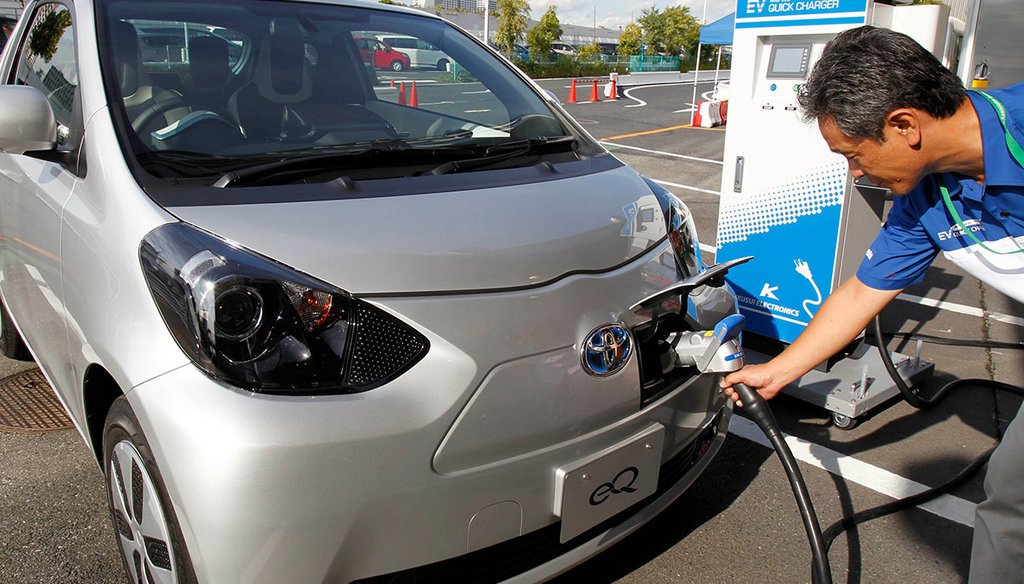Stand up for the facts!
Our only agenda is to publish the truth so you can be an informed participant in democracy.
We need your help.
I would like to contribute

A Toyota Motor Corp. press event participant puts a quick charger plug into the newly-developed compact electric vehicle "eQ" during a test drive Sept. 24, 2012, at a press event in Tokyo. (AP)
If Your Time is short
-
The U.S. is pushing electric vehicle sales but also limiting tax credits for them.
-
The limits are meant to spur manufacturers to build more EVs and EV components in the U.S.
-
The push could reduce the U.S.’ reliance on China, which dominates the EV manufacturing and the markets for minerals included in EV batteries.
Could new rules aimed at encouraging electric vehicle production in the U.S. slow their sales? Analysts’ answers are mixed.
On April 17, the Biden administration issued regulations that initially made only 10 of the more than 90 electric vehicles on the market eligible for the full $7,500 tax credit. That followed a proposal five days earlier for what the administration called the "strongest-ever" pollution standards for vehicles, meant to prime the pump for cars and light trucks that are not powered by fossil fuels.
Biden wants 67% of all sales of new cars and light trucks to be electric by 2032.
Automotive industry analysts said that although these Biden administration moves might seem contradictory, they’re aimed at two goals: providing consumer incentives to buy electric vehicles and promoting U.S. manufacturing of electric vehicles and their parts.
"They want everything," said Stephanie Brinley of the S&P Global Mobility analytical company in Michigan.
Analysts were mixed on whether the tax credit regulations will hamper EVs sales in the short term. One expected a short-term slowdown, but two others didn’t, because demand for EVs remains high and a manufacturing increase will make more vehicles eligible for the credits.
Electric vehicles will be important for achieving the Biden administration’s goal to achieve net-zero emissions economywide by 2050. Most of the world’s scientists agree that greenhouse gases released into the atmosphere from human activity are driving climate change.
Gasoline-powered cars are major emitters of greenhouse gases, particularly carbon dioxide. The Congressional Budget Office said that in 2021, emissions of carbon dioxide from transportation in the United States totaled 1.7 billion metric tons. That’s the most from any sector of the economy.
The $7,500 tax credit for buyers of new electric vehicles continues a policy President Barack Obama signed into law in 2009, when Biden was vice president. The Obama law limited the tax credits to 200,000 vehicles per manufacturer.
The $7,500 electric vehicle tax credit in the Inflation Reduction Act, which Biden signed in August, doesn’t limit the number of credits, but ruled out the full $7,500 credit for new EVs assembled outside North America.
In April, the Treasury Department, writing regulations for the law, narrowed the tax credit eligibility further. The regulations require that a certain percentage of the components and minerals in car batteries be sourced from the U.S. or in countries that are U.S. trade allies.
Limiting the tax credit is meant to encourage EV component supply chains, which China now dominates, to shift toward the U.S. and its allies, said Jeremy Michalek, director of the Vehicle Electrification Group at Carnegie Mellon University in Pittsburgh.
Brinley said limiting the tax credits jump-starts U.S. manufacturing of EVs and their parts.
"On a long-term basis, the electric vehicle market has to stand up on its own, it can’t always have incentives. So all of this is trying to get things moving," she said.
The Inflation Reduction Act’s emphasis on U.S. EV manufacturing led companies to announce billions of dollars in planned investments in U.S. manufacturing of EVs and their components, said Peter Slowik, a researcher with the nonprofit International Council on Clean Transportation.
If the administration meets its goal of having 67% of car sales be electric vehicles by 2032, it would mark a nearly tenfold increase in EVs. But that has its own obstacles.
First, the cars are significantly pricier than gasoline-powered models. Kelley Blue Book reported that new EVs on average sold for $58,940 in March, compared with $48,008 for gasoline-powered cars. Those prices already limit the audience. J.D. Power estimates that about two-thirds of electric or plug-in hybrid car owners earn more than $100,000. And a poll released in April by The Associated Press-NORC Center for Public Affairs Research showed 60% of respondents said the high cost of an electric vehicle is a major reason they would not buy one.
Second, because of the new sourcing and production rules, the number of brands is fewer. Bloomberg News reported that Ford Motor Co., General Motors Co. and Tesla have one or more fully electric vehicles eligible for the full tax credit. Ford and Stellantis NV have one eligible plug-in hybrid model each.
Bloomberg News added that seven more vehicles, manufactured by Ford, Stellantis and Tesla, will qualify for $3,750 half credits.
The made-in-North America proviso means industry award-winning models such as the Kia EV6 and Hyundai Ioniq 5, which are built in South Korea, are ineligible for federal tax breaks. So are Hyundai Motor Co.’s Genesis and Kia models, which are also made in South Korea.
Michalek said he expects the new regulations to slow EV sales temporarily. Slowik and Brinley said they don’t expect the new tax credit regulations to slow EV sales, because the manufacturing increase will make more vehicles eligible for the credits and because demand for EVs remains high.
Yen Chen, an economist with the nonprofit Center for Automotive Research in Michigan, said the Inflation Reduction Act expanded tax credit eligibility in some ways. Vehicle manufacturers’ finance companies can purchase EVs that aren’t eligible for consumers to get the tax credits. The finance companies earn the $7,500 credit and, theoretically, pass on the savings to consumers through vehicle leases, Chen said.
The law also made certain used EVs eligible for a $4,000 tax credit, he said.
He said that given electric vehicles’ high prices, tax credits are super-important for people who consider buying EVs.
"The major barrier, besides the places available for charging, is the price," he said.
RELATED: US versus China: Which nation is doing more to address climate change?
RELATED: Joe Biden has approved more oil drilling. Why? And does it undo his efforts to fight climate change?
RELATED: Joe Biden is pushing for more electric cars. Will there be enough charging stations?
Our Sources
International Energy Agency, "Global EV Outlook 2023," April 26, 2023
Protocol, "Companies are finally investing in making EVs in the US. Here’s a running list," Oct. 10, 2022
Email, Treasury Department spokesperson Ashley Schapitl, April 25, 2023
Email, International Council on Clean Transportation senior researcher Peter Slowik, April 24, 2023
Email, Jeremy Michalek, Carnegie Mellon University mechanical engineering and engineering and public policy professor, and director, Carnegie Mellon Vehicle Electrification Group, April 25, 2023
Los Angeles Times, "These are the EV models that will get you the full $7,500 tax credit," April 17, 2023
Los Angeles Times, "Editorial: Only a few EVs made the tax credit list. That’s bad news for the climate," April 20, 2023
Interview, automotive analyst Stephanie Brinley, associate director of AutoIntelligence at S&P Global Mobility, April 24, 2023
Interview, Yen Chen, Center for Automotive Research senior industry economist, April 24, 2023
GovTrack, "H.R. 1424 (110th): Emergency Economic Stabilization Act of 2008," accessed April 22, 2023
Federal Register, "Section 30D New Clean Vehicle Credit," April 17, 2023
IRS, "IRS issues guidance and updates frequently asked questions related to the new clean vehicle critical mineral and battery components," March 31, 2023
CNET, "These Electric Vehicles No Longer Qualify for the EV Tax Credit," April 20, 2023
The New York Times, "Electric Vehicle Tax Credit Rules Create ‘Chaos for Consumers,’" April 20, 2023
The New York Times, "U.S. Car Brands Will Benefit Most From Electric Car Tax Breaks," April 17, 2023
Politico, "These 14 EVs are the only ones left that get the tax credit," April 17, 2023
Cornell Law School Legal Information Institute, "26 U.S. Code § 30D - Clean vehicle credit," Feb. 17, 2009
Georgetown Environmental Law Review, "The EV Tax Credit Phaseout: Necessary or Not?", March 3, 2022
CNBC, "That $7,500 electric vehicle tax credit may soon be harder to get. Here are 2 workarounds," April 10, 2023
Congressional Budget Office, "Emissions of Carbon Dioxide in the Transportation Sector," accessed April 26, 2023









































